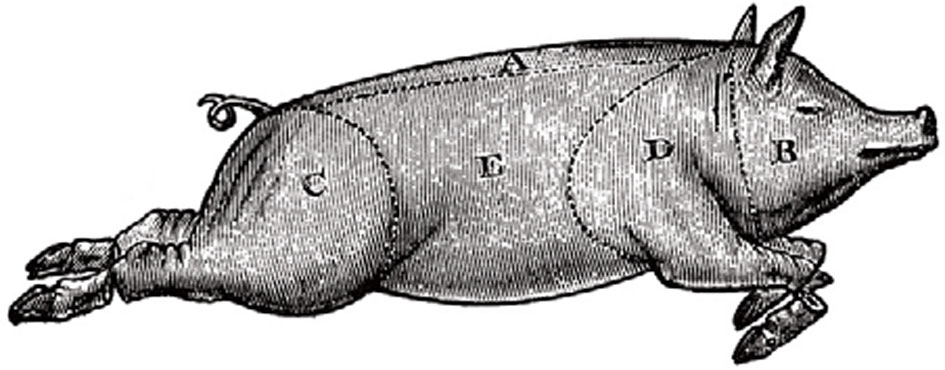Poor Man’s Feast: Smuggling Schmaltz
In the late 1950s, when our war was cold, the threats to our national security seemed largely rhetorical --- at least until The Bay of Pigs several years later --- so the act of air travel was a relatively simple and benign one: You got to the airport, you had your ticket stamped, you handed over your bags to the nice lady at the counter, you climbed up the stairs into your plane, and a few hours later you arrived at your destination. No one ever made you take your shoes off, or drink the breast milk you’d pumped for the infant you were carrying. No one ever seized the shrink-wrapped goat cheese you dragged back from Corfu, or confiscated the expensive Hoffritz nose hair clippers that your Aunt Ceil gave you when you left for college. In the 1950s, airport security checks and customs inquiries were at worst a mundane matter, unless you were carrying a rifle, a machete, or a suitcase, and that suitcase was dripping with chicken fat.
My father, a World War II night fighter pilot, was classified a threat to Canadian national security in the late summer of 1958, right around the time that Mantle and Ford were leading the Yankees to another World Series. He was not a dangerous man, nor was he particularly political in any way. My father was also not a Canadian, but he’d been bitten by the travel bug during his days in the Navy, and because he loved to fly, it seemed natural for him to take a job that actually required he do so regularly. A salesman for the now-defunct Knit-King Corporation, he briefly relocated to London Ontario on a work visa, which allowed him to easily travel back and forth across the border by plane, on company time and company dollar.
My father’s final stop on his trips down to the States was always Brooklyn, to visit his parents on Ocean Parkway, near Coney Island. Canada was an entirely different experience for a boy from the boroughs, and being so far from his home often made him wistful and nostalgic. One night, when he made it clear to his mother that his specific brand of homesickness was manifesting itself in violent midnight cravings for the ethnic dishes of his you that he could not get in London, Ontario --- particularly those cooked in golden, glorious chicken fat --- she responded in the only way she knew how: she helped him pack his suitcase and in it, she nestled a jar of her home-rendered schmaltz so that he could cook those dishes for himself, on his own little electric burner, in his own little kitchen, in another country.
Despite the fact that my grandmother had very carefully stowed away the illicit cargo among my father’s freshly laundered cotton briefs and Brooks Brothers’ shirts, the authorities found it. Not one to accept the modern science at face value, she neither believed nor particularly cared about the laws surrounding air pressure. Although she had secured the lid with a trusty wax paper and rubber band seal, it had leaked; by the time his plane touched down in Toronto, my father’s suitcase was drenched in chicken fat, and any hope of his making salami and eggs the next morning was dashed.
“What exactly do you do with this stuff, Mr. Altman?” the customs official asked, suspiciously holding up the now half-empty jar to the light.
“You cook with it,” my father answered, before being instructed to plunge his hand into the jar in order to prove that, in fact, there were no diamonds or dope lurking around at the bottom of the brilliant muck.
But to my father --- and many old-school Mitteleuropish- style cooks before and after him --- schmaltz (the rendered fat of a bird, usually chicken but often goose or duck; many also consider lard and beef tallow to be forms of schmaltz) itself was more valuable than diamonds or dope: earthy in flavor, stratospherically high in cholesterol (although proponents now claim it to be high in HDL, or good cholesterol and low in LDL, bad cholesterol) and saturated fat, it is the sine qua non of cooking fats and experiencing a rebirth thanks to nose-to-tail cookery. For traditional Jewish or German home cooks, there is nothing that comes close for flavor, heat stability, or sheer culinary voluptuousness. Schmaltz fanatics, like my late father and my grandmother, will do anything in order to have their beloved fat, include become international smugglers.
That day at the airport, finally convinced that my father was not dangerous, the authorities sternly informed him that, much like the aforementioned diamonds or dope, it was illegal to transport certain foods across the border into another country; chicken fat was surely one of those foods, they told him, even though it wasn’t on their official list.
Outraged by the gall of the customs guards in Toronto, my grandmother made it her life’s work to send her son back to his new country with foods cooked in schmaltz, no matter the rules. On his next trip, she surreptitiously planted a jar of griebenes --- chicken skin crispings and onions cooked in chicken fat; it’s often called Jewish crack --- inside one of his cordovan wingtips. The authorities found and confiscated it. Weeks later, they discovered a container of chopped liver cooked in chicken fat hidden in his Dopp kit underneath his shaving brush. Again, the authorities found it, proclaimed my father a threat to national security, promised to deport him should he be caught again, issued him a small fine , and told him politely to have a nice day (it being Canada).
Eventually, traveling back to his adopted home became less onerous for my father after he successfully complained about his woes: he didn’t care much for his new status as a threat to Canadian security. His laundry bills were unreasonably high. The amount of money he was spending on new underwear, socks, and Brooks Brothers’ shirts was getting ridiculous. And on at least three occasions, his entire travel wardrobe wound up smelling exactly like her apartment on a Friday night, which was not a good thing for a lonely bachelor who might be looking for love, or any reasonable facsimile of it. My grandmother, convinced that her sonny boy would starve, tearfully relented and agreed to stop sending him back to Canada with this luscious, clandestine food of people that leaked through her flimsy wax paper wrappings and all over his fancy clothes. In turn, he promised her that should he become really homesick and desirous of the dishes that are traditionally cooked in schmaltz --- salami and eggs, griebenes, chopped chicken liver --- while living in the barren icy tundra of suburban Ontario, he would somehow procure a kosher chicken and render the fat himself. After all, he told her, Canada was not exactly a foreign country.
On his last round trip, secure in the knowledge that he would be neither detained nor malodorous upon his arrival, my father kissed his mother goodbye and headed out by taxi to Idlewild Airport. His flight was uneventful and, as always, the security guards in Canada greeted him pleasantly, and pointed to his suitcase.
“Open it, please, Mr. Altman.”
He complied, no doubt with a certain amount of haughty arrogance.
“You do understand by now, Sir, that the transporting of certain foodstuffs across our international borders is illegal and considered a breach of national security.”
My father nodded, smiling.
“There’s nothing in my suitcase, Gentlemen, except for my clothes. But feel free.”
My father was held in custody and questioned for several hours that day, after the customs agents discovered and seized a three pound kosher salami carefully hidden by my grandmother in a pair of her own flesh-colored support hose. Rubber-banded to the meat was an oily, stained note written on wax paper: “So you shouldn’t go hungry. Love, Mom.” But the salami had been a foil: wrapped in dirty underwear and tucked into the zippered laundry compartment of his suitcase was a jelly jar containing her prized schmaltz that the authorities, thrown off scent by the meat, never found.
I’d heard this story for years, but I never actually found out whether or not my father’s hasty return to the States shortly thereafter was the result of his being deported as a security risk; I do like to think that just having that official classification made him feel ever the spy in the later years of his life.
When a heart condition eventually prevented him from eating anything cooked in schmaltz, and older age made him perhaps a bit bored and a lot reflective, he relied on his peculiar relationship with airport security --- any airport security --- for a touch of excitement: he’d try and outsmart them, and when he invariably did, he’d read them the riot act about not providing enough protection for the common traveler. In nearly every airport from Ft. Lauderdale to Milan, my father, well into his seventies, carried onto flights any number of items now considered highly suspect: a set of metal collar stays. A ladies’ nail kit with file and clippers. Several French waiters’ corkscrews. Various pocket knives including a six-inch switchblade. On other occasions, he made it back home carrying a whole wheel of Gruyere from Switzerland, Scotch Eggs from London, and frozen apricot palascinta from Prague. Perhaps, as an older man, he didn’t appear suspect. Nevertheless, he generally fessed up and handed the more potentially dangerous goods over once he got onto the plane, waging his finger in dismay at the embarrassed flight attendants. The food, however, he kept.
It was on his last trip --- one that we took together --- that my father was stopped by a customs agent as we were traveling back to the States from France.
“Sir, can you please open your bag---“
He obliged, unzipping his tan Hartmann carry-on, while I waited for him, wondering if somehow, he’d managed to slip a little bit of goose schmaltz from Alasace into his bag next to his razor.
“Are you bringing anything illegal back into this country Mr Altman? Guns? Weapons? Firearms of any sort? Knives? Chemicals? Bombs? Foodstuffs?”
My father shrugged.
“No son, I’m not.”
The security guard began unpacking my father’s bag: assorted travel brochures, socks, a few extra pair of boxer shorts, his shaving kit, a Quick Guide to French, a Plan de Paris all sat in a pile on the table. A smile spread slowly across the guard’s face, as he rummaged around the bowels of the bag. Buried at the very bottom, tucked inside a red striped basketball socket, was half of a 12-inch Lyonnaise garlic saucission. The other half had been sliced off cleanly.
“Where is the rest of it, sir?”
“I ate it on the plane, Son. Am I in trouble?”
The security guard tossed the French salami into a bin filled with boxes of pasta, a couple of enormous rounds of confiscated Pecorino, and a variety of foreign looking vegetables. He shook his head and waved my father through the check point.
“Be more careful next time, Sir.”
My father just smiled.
In the cab on the way home, as we drove along the East River, my father marveled, as he always did, at the beauty of the city skyline at night. Feeling somewhat peckish after his long flight home, he flipped open the tiny Opinel cheese knife he was carrying in his back pocket, removed the other half of the sausage from his telephoto lens case, leaned forward, and shared it with the driver.





